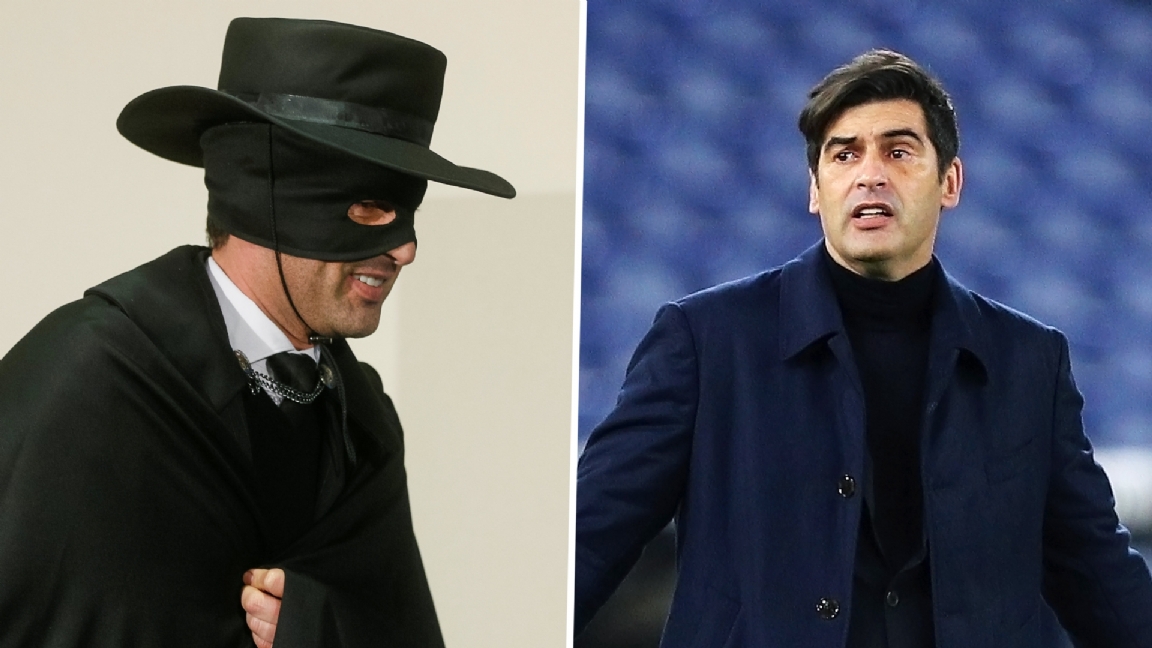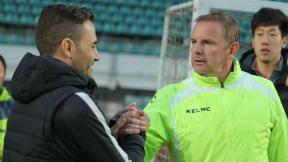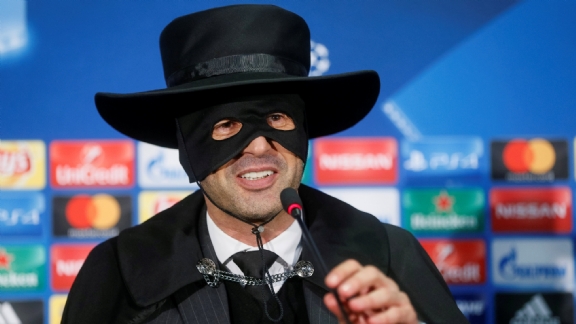![]()

If you compare the game of 1o Dezembro from 2007 and that of the current AS Roma, the view must be almost the same. That is what Paulo Fonseca himself claims, the 48-year-old coach who rose from the club in the depths of Portuguese football to the European top. Coming Thursday, the first leg of the quarter finals of the Europa League awaits Fonseca, in which he will meet a team with Ajax with the same philosophy and must achieve a good result to take the pressure off.
By Chris Meijer
Floris Schaap and Fonseca must have met for the first time sometime between 1995 and 1996. The Dutchman played that season in what turned out to be the autumn of his career for SC Braga, while Fonseca was leased by FC Porto to Leça. “I can’t remember that very well,” laughs Schaap. Their paths then crossed one more time, when Schaap was assistant coach to Manuel Cajuda at Olhanense and Fonseca had Paços de Ferreira under his wing. Nevertheless, Fonseca has become well known to Schaap in recent years. Hugo Cajuda – the son of the trainer on whose side Schaap worked for many years and for whom he occasionally performs manual work – represents the interests of Fonseca. “I know him personally, he is a nice and fun guy. It is very clever how he built up his career and moved up from the youth. ”
Preview Ajax – AS Roma: ‘Qualitative it is not great, you are not afraid of that’
More videos
“I was not a very good player,” Fonseca once admitted in an interview with the Daily Telegraph. Born in Mozambique, he grew up in Africa until his parents decided to return to Portugal at the age of fourteen. Fonseca started his professional career with Barreirense and was picked up by FC Porto at the age of 22, although he would not play any official game for the Portuguese superpower. After having been rented to Leça, Belenenses and Marítimo and having been under contract with Vitória Guimarães for a while without playing too much, Fonseca decided his career with Estrela Amadora, who was at that time shuttling between the highest and second levels . After ending his active career, Fonseca remained active as a youth coach at Estrela Amadora.
Fonseca spent the early years of his coaching career in the depths of the Portuguese football pyramid. He coached 1o Dezembro, Odivelas and Pinhalnovense, clubs where training had to be done in the evening because the players just worked during the day. With Pinhalnovense, Fonseca nevertheless managed to reach the quarter finals of the Portuguese cup twice, a double achievement with which his name slowly appeared on the radar. “From the beginning of my coaching career, I have always thought that winning is not enough,” said Fonseca. “I have to play well, I like it when my teams have the initiative. My ideas have only evolved through my experiences. ”
“His time at Aves turned out to be a turning point in his career,” says Schaap. Fonseca finished third with Aves at the second tier of Portuguese football and earned a switch to the Primeira Liga-based Paços de Ferreira. There he wrote history by finishing third and forcing a place in the preliminary round of the Champions League. It was reason for FC Porto to bring him in as the new trainer. “The step to Porto was a bit too big, he didn’t like it,” Schaap thinks. “In that year he didn’t have the best group of players in Portugal, I have to be honest about that. I’m not saying he wasn’t prepared or they wouldn’t have offered him a contract. But Porto is a special club, the pressure increases very quickly if you lose points. ”

‘The president immediately tore up his contract and threw him out of the country’
Read here the story of Floris Schaap, who left for Portugal at the age of 21 and subsequently also worked in the United Arab Emirates, China, Thailand and Iran.
“It didn’t go well, but it was the best thing for his career. Because of that setback, he took a step back and then things moved forward. I am not saying that he was not ready, it was all not going well ”, continues Schaap, who lived in Portugal for almost 35 years. Fonseca returned to Paços de Ferreira and made a slightly smaller step up a year later, to SC Braga. “Braga is close to Sporting, Porto and Benfica, you know. It is also not easy to join a top club, if there are only three of them. ” At Braga, Fonseca won the first main prize of his career with the Taça de Portugal, before embarking on his first adventure outside of Portugal with Shakhtar Donestk.
Fonseca seemed to be in for a tough task there. He succeeded Mircea Lucescu, who gave Shakhtar eight national titles in twelve years, six times the Ukrainian Cup and a UEFA Cup and literally has a statue in front of the stadium – which has not been played for years due to the civil war in Ukraine. In principle, there was no budget to bring in new players, unless Shakhtar would qualify for the Champions League through the preliminary rounds. This did not work, so Fonseca had to do it with the same group of players that had finished seven points behind champion Dynamo Kiev the year before. “If you don’t have the best players, you have to get started as a trainer and get the team playing football as soon as possible. His training method is such that a team always moves forward. I know his technical staff (assistant trainer Nuno Campos, technique trainer Tiago Leal and physical trainers Pedro Moreira and Nuno Romano, ed.), They are good guys. He’s been working with the same people for years. They know exactly how he thinks and what to do, they can trust each other blindly, ”explains Schaap. Fonseca managed to create a football machine that, with an attacking and dominant 4-2-3-1 formation, was supreme in Ukraine for three years and impressed in Europe.

Fonseca during the conscious press conference, dressed as Zorro.
Fonseca made Lucescu completely forget about Shakhtar in his second season, after surviving the group stage of the Champions League thanks to a 2-1 victory over Manchester City. After that victory, Fonseca appeared at the press conference dressed as Zorro, following a bet with team manager Vitaliy Khlivnyuk. “It was a joke at the time and I didn’t expect it to have such an impact,” explained Fonseca. I was asked who my idol was as a child and I replied, I loved Zorro. So we had that bet and when we beat City, Vitaliy came up with that suit. ”
The dress-up party may have introduced Europe to Fonseca, but in the years that followed, his name was also buzzing through Shakhtar’s football in the top leagues. Mainly because of the attractive playing style that his team showed on the field. “He is a trainer who wants his team to have a lot of ball possession and to play football from back to front, without long balls or counters. He likes a team that plays good football, with passing and possession. Just like Ajax, actually. That comes together a bit ”, is how Schaap describes Fonseca’s philosophy. “The ideas he has for the team must be implemented. He is not flexible about that. But he does hear everyone. He is a very democratic trainer, but with discipline. There is a lot of talk with the players, despite the fact that he decides. In that respect there is a bit of a mix. ”
58577000.png)
Fonseca could just have come to his current playing style at AS Roma that way. Initially, he tried to implement Shakhtar’s 4-2-3-1 system in the Italian capital as well, but when the Europa League seemed to slip out of the hands last season, he decided to change the formation. Fonseca switched to a 3-4-2-1 system, remained unbeaten for the last eight league games (seven wins and one draw) and grabbed a ticket to European football. Roma currently occupies seventh place, five points behind number four Juventus (holding a virtual Champions League ticket) and number five Napoli (holding a virtual Europa League ticket). Schaap: “It’s not easy in Italy, because teams play there with many different tactics. He sometimes goes into the boat with that, because he wants to play football from behind. No catenaccio, never that. I think he does a little better with Roma every time. He doesn’t have an absolutely top team to compete for the league title, that’s how I see it. They have good footballers, but you can’t compare it to Inter or Juventus. They also put in a lot more money. ”
Nevertheless, the expectations of Roma are always perhaps slightly higher than realistic. It is the reason that Fonseca has faltered several times in recent years, if the reports in the Italian media were correct. After Saturday’s 2-2 draw against Sassuolo – the third game in a row that Roma failed to win – wrote Il Messaggero for example, that Roma will only keep him next summer if the Europa League is won. The Corriere dello Sport went a step further on Tuesday by stating that the situation is so serious that players, led by Edin Dzeko, train individually elsewhere outside the group training sessions in preparation for the match with Ajax, because there is dissatisfaction with the approach towards the meeting in Amsterdam . Fonseca has an expiring contract in Rome. “I think his ceiling is even higher. But yes, what is higher? Roma is also absolute top, you know. But he is capable of even higher, yes. They are never satisfied with Roma, you know that. ”
Fonseca could take the pressure off with a good result in Amsterdam against Ajax. “I don’t think it will be an easy game for both teams”, predicts Schaap. “If you have two footballing teams, usually the side that defends best wins. Those Italians can defend quite well. Ajax also has footballers of great quality. It will be a fifty-fifty party, mainly because of the styles. It is probably good for Ajax that they meet Roma, a football-playing team. ”